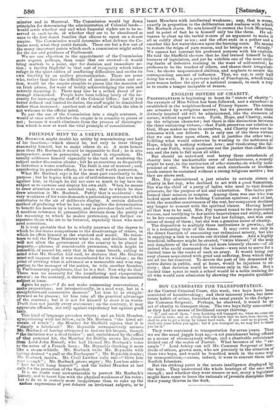FRIENDLY HINT TO A USEFUL MEMBER.
Mr. ROEBUCK might double his utility by remembering one half of his function,—which should be, not only to treat things reasonably himself, but to make others do so. A more honest man than Mr. Roebuck it would be impossible to find ; he is also independent, acute in perception, and clear in exposition. He usually addresses himself especially to the task of rendering the subject under discussion clearer ; but he so contrives as frequently to introduce a worse confusion. The fault is one of manner ; and, Considering its privative effects, it is one well worth correction. What Mr. Roebuck says is for the most part excellently to the purpose ; but he begins with an air of self-reference that sets men against him, as though he did not care so much to lay bare the subject as to exercise and display his own skill. When he means to draw attention to some national topic, that to which he does draw attention is Mr. Roebuck. Partly that is accidental : the very weakness of his voice demands a painstaking utterance which contributes to the air of deliberate display. A certain didactic method of prefacing what he has to say implies the determination to benefit his hearers by a lecture, and so provokes their self-love. A needless reference to personalities detracts from the purity of the reasoning to which he makes pretension, and further ex- asperates those who are to be lectured, especially those who most need correction.
It is very probable that he is wholly unaware of the degree to which he institutes comparisons to the disadvantage of others, in which he offers himself as the standard and model. He volun- teers to tell the Prime Minister what to do, and declares that he not allow the government of the country to be placed in jeeparcly,—phrases of considerable pretension, which might be eontieded, or passed by, only that in the same breath, calling to mid what Mr. Grattan had said, he declares that Mr. Grattan Meet not suppose that it was remembered for its wisdom : on the point of uttering what is advanced as a memorable and wise sug- ration to the manager of the nation, he tells another Member, in Parliamentary periphrasis, that he is a fool. Now why do that? There was no necessity for the humiliating and exasperating avowal ; on the contrary, it distracted attention from the material meet at issue. Again be says—" I do not make unmeaning asseverations, I make propositions; not interjectionally, in a mad way, but in a straightforward consecutive manner." Let him be as straight- forward as he pleases ; let him take all the practical advantage of the contrast; but it is not for himself to draw it in words. Truth does not justify every statement ; on the contrary, it may aggravate offences, not only against expediency but against good taste.
This kind of language provokes retorts ; and an Irish Member, sympathizing with his fellow, calls Mr. Roebuck "the hired ad- vocate of rebels "; the Member for Sheffield rejoins that it is s'aiimply a falsehood." Mr. Reynolds retrospectively accuses Mr. Roebuck of having attempted to imitate his brogue, though "the imitation was a dead failure"; and, emboldened by the effect of that personal hit, the Member for Dublin avows his dissent from Lord John Russell, who had likened Mr. Roebuck's voice to the notes of a French horn ; Mr. Reynolds thinking it more like a steam-whistle. Mr. Roebuck twits Mr. Reynolds with having desired "a pull at the Exchequer " ; Mr. Reynolds denies ; Mr. Roebuck insists. Mr. Cecil Lawless calls out—" Give him rope enough" ; Mr. Roebuck grows angry ; Mr. Lawless adds- " And he will bang himself"; and the baited Member at last calls for the protection of the Speaker. It is no doubt very unwarrantable to pervert Mr. Roebuck's history, and to taunt him with the physical weakness of his voice ; but to do so is scarcely more inopportune than to rake up the Odom expressions of past debates on irrelevant subjects, or to taunt Members with intellectual weakness; nay, that is worse, exactly in proportion to the deliberation and coolness with which Mr. Roebuck starts. He sets himself to correct the Irish Members, and in point of fact he is himself only too like them. He ad: vances to clear up the turbid waters of an argument to make it all as coldly clear as ice ; and the effort ends in a pother and a smother like hot water thrown upon the burning coals. He means to restore the reign of pure reason, and he brings on a "shindy." We cannot but contrast his professed purpose with his exploits. He told the Sheffield electors that he had trained himself to the business of legislation, and yet he exhibits one of the most strik- ing faults of defective training in the want of self-control; he professes to be the teacher of others, and shares their irregulari- ties; he shows unquestioned abilities, and neglects to secure the corresponding amount of influence. That, we say, is only half doing his work. It is a perverse kind of Penelopism, which trails pure reason before the eyes of a national council, in such a way as to excite a temper incapable of reason.


























 Previous page
Previous page